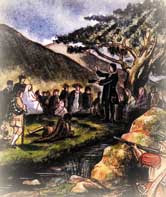Posted at Reformation Scotland:
Much as we would like to start a new year with a sense of optimism, sometimes the outlook only seems forbidding. January blues may conspire with nagging feelings of being spiritually in a low place to make Christians discouraged. The Covenanting minister John Welwood (1649–1679) was aware of many reasons for pessimism, yet in the following updated letter he wrote of ways to turn every possible discouragement into a reason to take comfort.8 July 1675
Dear sister,
WE HAVE TO LIVE BY FAITH
If I had things according to my own wishes, I would have the light of the Lord’s countenance shining over on me, and the upper hand over all my enemies. But when I was restless in this way and unsatisfied, I was taught to live by faith – a very profitable thing for us, and pleasing to God, but we are so backward to it, because we do not want to believe until we can see.
Yet the Lord is much displeased when we doubt His love, especially since we have so many evidences of it, since He has often manifested Himself to us, and worked in our souls. Unless He is actually smiling, we will not believe that He loves us! If He dandled us in His lap for twenty years, and then hide Himself from us, we would instantly be suspicious whether He had ever loved us at all. But it is much more pleasing to Him, and profitable and comforting to ourselves, to venture to believe that He does love us. He does not play tricks on His people. We may build on His Word and His work in our souls, for Christ is no dissembler.
I know nothing that should discourage a Christian. There is not one discouragement in all the Word of God, but many are His encouragements. But through our folly and unbelief we lose the comfort of them.
See also:
